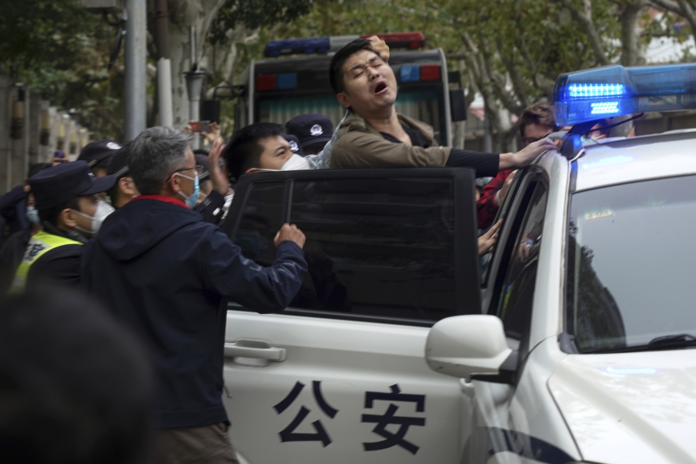Tiananmen had its symbols — the square itself, the Monument to the People’s Heroes, the plaster Goddess of Democracy Statue. The Covid protesters have the blank, letter-size paper they hold up to highlight censorship and their inability to say or post anything critical of the Party or government. This has led to the nickname “White Paper Revolution,” or the “A4 Revolution” — referring to the paper’s size.
There was a lone protester who unfurled banners on a bridge spanning the capital’s Third Ring Road just before October’s Communist Party congress, demanding an end to incessant coronavirus testing and lockdowns, access to food, and for dignity, political reforms and elections. The man was quickly arrested and his fate was unknown, the circumstances prompting many outside China to dub him “Bridge Man” — evoking the still-anonymous “Tank Man” who faced down a line of tanks just off Tiananmen Square in June 1989.
The impact of China’s violent crackdown on the protesters of 1989 was to terrify the citizenry into not repeating — or even speaking of — the events of that spring. After weeks of dithering, the Party reasserted its authority with its violent suppression of the movement.
But oddly, although China is far from a democracy, the people nonetheless obtained much of what they had been seeking in 1989. When I returned to Beijing for a three-year stint a decade ago, Chinese people could own apartments and even sprawling villas. They could work for foreign companies in China and earn good salaries. They traveled internationally as tourists flush with cash and bought suitcases of luxury goods or studied abroad for coveted elite degrees. They even bought property overseas
Whether that is despite, or because of, the violent crackdown on Tiananmen Square is still debated. Today, however, the Party does not dither. It continues to arrest and pursue those it sees as committing or contributing to sedition. It does not want to send soldiers into the streets, but it is sending out legions of uniformed and undercover enforcement, and Xi will do whatever it takes to maintain the Party’s main pillar of control: ensuring social and economic stability.
The impact could be similar to 1989; citizens may finally be feeling some relief from zero-Covid. On Wednesday, Vice Premier Sun Chunlan, the top official in charge of China’s Covid response, said the country faces a “new stage and mission” in pandemic controls — a possible hint at a course correction. Xi himself told visiting European Council President Charles Michel that the coronavirus’ Omicron variant “is less deadly than Delta, which makes the Chinese government feel more open to further relaxing Covid restrictions,” an EU official quoted the Chinese leader as saying. Both statements suggest Xi is considering easing the pandemic restrictions — possibly in response to the vitriolic protests.
What the Tiananmen Protest Can Tell Us About China’s Zero-Covid Unrest
RELATED ARTICLES



